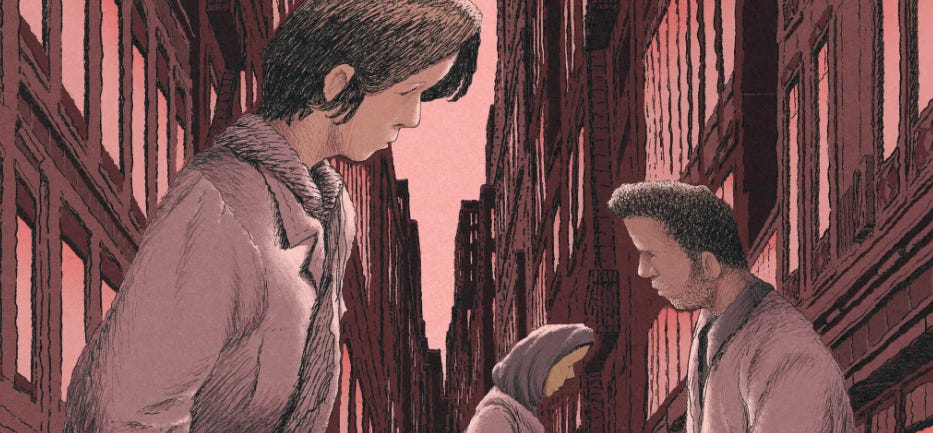The Tissue Review - Q1 2024: Reconnecting with our favorite curated lists so far this year
Exploring new reads - and revisiting past ones - on loneliness, spirituality, and education
It’s been a busy first quarter for Connective Tissue! So far this year, we’ve published 7 curated lists, 4 Q&As, and 3 original pieces that have accumulated 23,000+ views. And thanks to your support in reading, engaging, and spreading the word, we’ve doubled our following since January 1st from 400 to 800 subscribers. (Time to get on this rocketship, VCs 🚀🚀🚀)
With all this (modest) growth, we thought it would be worthwhile to revisit some of our favorite curated lists from the first few months of this year. For each list, we share one read that has continued to stick with us, as well as one new read — related to the theme — that we found compelling. We hope this provides an opportunity to deepen your engagement with a specific theme, or, simply, to check out a piece (or newsletter) you missed.
We’re considering doing this type of recap every quarter, so let us know what you think about our approach. Was it a useful reflection? Or should we just stick to putting out new lists?
Reflectively,
Sam, David, + Eric
Beyond Loneliness (link here)
Favorite Read: New York Times - “We were wrong about what happened to America in 2020” by Eric Klinenberg (Jan. 2024)
“Loneliness was never the core problem. It was, rather, the sense among so many different people that they’d been left to navigate the crisis on their own.”
Klinenberg draws on the birth and demise of Mac’s Public House as an emblem of the civic “long Covid” still afflicting so many of us today. He posits that the pub and its owners had noble, rule-abiding intentions, but that it was abandoned and starved by the city government that was meant to help it flourish. This institutional abandonment — this denial of care where care was needed — challenged us in Covid and still challenges us today, leading to a society-wide sense of isolation and neglect. If we want to find our way out of this civic crisis, Klinenberg asserts that schools, medical authorities, local governments, employers, and neighbors need to re-establish an orientation toward support, trust, and care.
New Read: Wisdom of Crowds - “The Adventure of Loneliness” by Chris Morgan (March 2024)
“Loneliness was once considered a normal stage of life, a sad stage but one that could be fruitful as well. During a period of loneliness, especially if that period comes early in our lives, we can become individuals. But today, loneliness is seen as a social disease.”
Could loneliness be a good thing, or, at the very least, a natural human experience? Chris Morgan challenges the prevailing belief system of “loneliness-reformers,” who see loneliness as a problem to be solved “... from above in a typically authoritarian spirit.” Morgan stakes out the position that individuals should embrace loneliness in resistance to “coherence and conformity” and in reclamation of “private existence.” The author’s perspective flies in the face of the current cultural zeitgeist — and that’s exactly why it’s worth reading.
Getting Spiritual (link here)
Favorite Read: Comment Magazine - “Church, where are you?” by Anne Snyder (Dec. 2023)
What is the role of the church in America’s 21st century social architecture? Speaking to a largely Christian audience, Snyder writes with exasperation about the transformative, restorative potential of the church to remedy our societal and individual ills — and its continual failure to meet the moment. To Snyder, the average congregation has “ceded the floor” in providing “a home that is trustworthy enough, believable enough, vibrant and countercultural enough, [for us] to lay down our defences, to be our full selves, and to submit.” At a moment when Americans need solidarity in the face of disconnection, grounding in the face of upheaval, and commitment in the face of optionality, the church is missing in action. Snyder concludes by encouraging the reader to ask: “Church, where are you?”
New Read: American Storylines - “Young Women Are Leaving Church in Unprecedented Numbers” by Daniel Cox and Kelsey Eyre Hammond (April 2024)
Over the past 20 years men have disaffiliated from religion more than women, but that pattern has now reversed among Gen Z women. Whereas only 14 percent of Boomer women are religiously unaffiliated, nearly 40 percent of Gen Z women no longer affiliate with religion. Among men, the gap is much smaller: 23 percent of Boomer men are unaffiliated compared to 34 percent of Gen Z men. When it comes to the culprit for this sharp decline among Gen Z women, the authors point to several factors, including concerns about gender inequality in the church, the treatment of LGBTQ+ people, and the continued shift of Gen Z women to the political left. The authors conclude by noting that, “none of this is good news for America’s places of worship,” as “people who leave religion rarely come back.”
Bonus Listen: For the Life of the World - “A World Out of Joint” with Ryan McAnnally-Linz and Evan Rosa (April 2024)
What better time than now for our first podcast share? This interview, which draws on Christian theology but is applicable beyond Christians, explores the deeply spiritural work of homecoming and homemaking. McAnally-Linz points to three powerful and distinct examples of homemaking in practice: Dorothy Day’s work to cultivate communities of care through the Catholic Worker movement, Julian of Norwich’s ministry of solitude as an anchorite, and a Canadian farm family’s efforts to become more at home among vast communities of life — people, creatures, and land, all together.
→ Listen to the full episode here.
Schools, Morality, & Relationships (link here)
Favorite Read: New York Times - “Why Universities Should Be More Like Monasteries” by Molly Worthen (May 2023)
“We need an intervention … selectively returning to the university’s roots in the monastic schools of medieval Europe and rekindling the old-fashioned quest for meaning.”
In the face of technological creep into all facets of university life, Dr. Worthen presents a radical solution: colleges should offer “a secular monastery within the modern university, with a curated set of courses that ban glowing rectangles of any kind from the classroom.” To bring her point to life, the author highlights several courses inspired by monastic living that are consistently on college campuses. At the University of Pennsylvania, for example, Professor Justin McDaniel teaches “Living Deliberately,” which asks students to adopt the practices of monastic traditions, including a one-month vow of silence and fast from technology. Worthen argues that these courses stress what colleges should focus on most: helping students unearth their ultimate values and cultivate the skills of attention so that they can navigate life with moral clarity and intention.
New Read: New York Times - “What We Gained (and Lost) When Our Daughter Unplugged for a School Year” by Damien Cave (March 2024)
“Something in the act of writing, sending and waiting days or weeks for a reply, and in the physical and social challenges experienced by our daughter at a distance, is changing all of our personal operating systems. Without the ever-present immediacy of digital connection, even just temporarily, can a family be rewired?”
The author, an American parent living in Sydney, chronicles the tale of sending his teenage daughter away to a private, digitally disconnected school in remote Australia. The experience was powerful — for both the parents and the daughter — and the piece is just as poignant, bringing us all back to the days when lengthy handwritten letters were the primary mode of correspondence. This piece demonstrates how the social context of a school can shape the relational lives of students and parents alike. And it raises a question of what we all might gain (in penmanship and character) from a slower approach to communication — as children, as parents, and as families.







